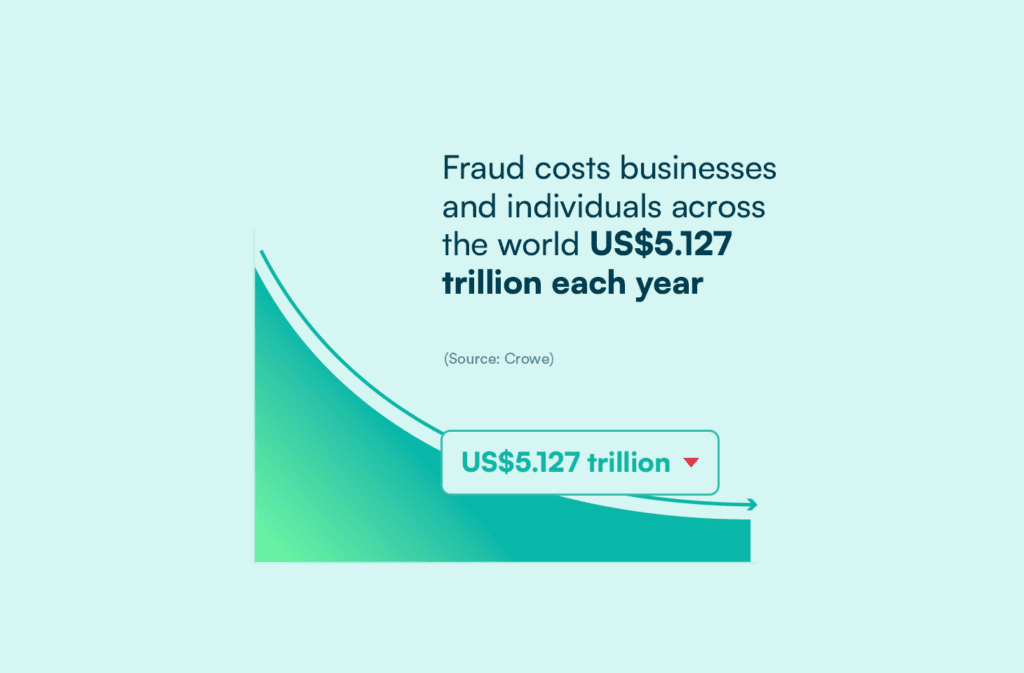Over the past few years, fraud has become a recurring challenge that businesses struggle with and the issue of fraud prevention has been deliberated on in various discussions. In 2024, organizations globally could lose up to $4.7 trillion to fraud, amounting to 6.3% of global GDP. This means businesses of all sizes are confronted with the looming threat of fraudulent activities on their platforms. It’s important to note that fraud can have severe consequences beyond just the loss of funds. It can damage a business’s reputation, destroy customer trust, and even lead to the closure of the business in some cases.
Various statistics have shown the detrimental impact of fraud cases on businesses. While businesses lose substantial amounts of money, it remains a continuous battle to effectively combat fraud in the digital landscape. For instance, approximately 1.1 million reports of identity theft were collected by the Federal Trade Commission (FTC) in 2022 and 1 million reports were filed in 2023. This statistic and several others emphasize the critical need for businesses to implement effective fraud prevention strategies. It is no longer a matter of debate – businesses must work with the most effective and efficient fraud prevention solutions.

In this article, we will discuss the importance of taking fraud prevention seriously for your business and explore some of the ways you can protect your business from fraudulent activities.
Understanding Fraud: Types and Impacts
Fraud comes in many forms, each with its own set of challenges. From credit card fraud to identity theft and phishing, these malicious activities can have devastating effects on any business. Listed below are some common types of fraud cases that businesses and individuals have experienced in the past and continue to face today.
Common Types of Fraud
- Credit Card Fraud: This occurs when someone uses a stolen credit card to make unauthorized purchases. It’s one of the most common types of fraud.
- Identity Theft: Fraudsters steal personal information to impersonate someone else, often leading to unauthorized transactions.
- Phishing: Scammers send fake emails or texts to trick people into revealing sensitive information, such as passwords and credit card numbers.
- Online Scams: These include fake online stores, auction fraud, and other deceitful tactics to steal from unsuspecting consumers and businesses.
- Internal Fraud: Employees might commit fraud by manipulating records or stealing company funds.
- Account Takeover: Hackers gain access to user accounts, allowing them to make unauthorized transactions or changes.
Impact of Fraud on Business
The impact of fraud on businesses can be quite overwhelming. Companies can lose funds to unscrupulous individuals. Apart from this, the resulting damage to the reputation that has been built over the years can be significant. There are numerous examples of the devastating impact fraud can have on individual businesses. For instance, fraud is costing businesses and individuals across the world US$5.127 trillion each year. Beyond financial loss, customers who experience fraud may lose trust in your business. A tarnished reputation can lead to a loss in customer loyalty, which can be challenging to rebuild.
Key Fraud Prevention Strategies
Every problem has a solution, and fraud is no exception. It’s time for businesses to come together and invest heavily to tackle fraud effectively. To do so, businesses need robust strategies and reliable solutions that can effectively address fraud cases in real-time, while ensuring compliance.

As a fraud prevention solution provider, we have discovered and worked on some proven methods to protect your company from fraud and detect fraud in real time.
The human factor remains the greatest vulnerability in your organization’s defense against fraud. While most companies concentrate on external causes of fraud, the internal link involving employees and customers is often overlooked. Businesses must realize that employees are the first line of defense against fraud. Investing in training them to recognize and report suspicious activities.In addition, providing regular workshops and updates on the latest scam tactics, and setting up automated alert systems for phishing, malware, and other types of identity fraud. Combining these tactics can keep them informed and vigilant.
In addition, closely monitoring transactions and account activities from your users or customers is crucial. While this may seem like a daunting task, Identityradar by Prembly has simplified the process using “Radar Rules.” Radar rules help businesses track unusual activities on their customers’ accounts, such as sudden spikes in transaction amounts, changes in IP addresses, and fluctuations in transaction frequency. By leveraging AI-powered analytics to spot unusual patterns, you can establish an automated fraud detection system that can alert you to potential threats in real time. The quicker you identify a possible issue, the faster you can respond.
Conclusion
Fraud prevention is about being vigilant and proactive. Understanding the types of fraud and their impacts is the first step. Partnering with a fraud prevention solution provider like Identityradar gives you an edge in delivering strong security measures and spotting unusual patterns in your users’ accounts, ultimately shielding your business from the devastating effects of fraud. Now is the time to act – get started with Identityradar today and take proactive steps to protect your business from the ever-evolving threat of fraud.







